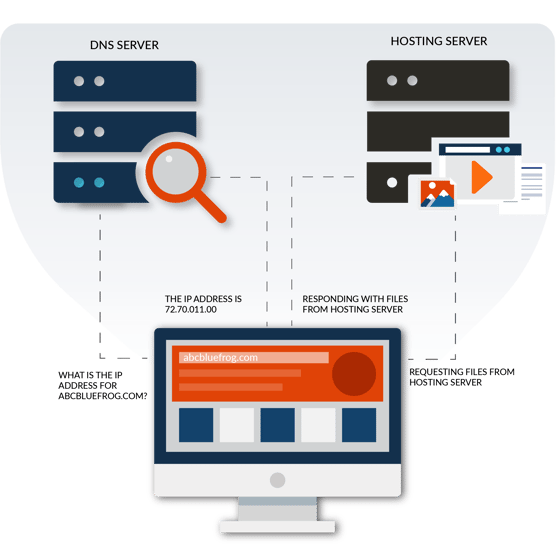
Have you recently built a new website, or are you in the process of redesigning one that was built long ago? Perhaps your website is loading slowly or no longer allows certain functions to run smoothly for your users. If any of these scenarios apply to you, it’s likely you either need to explore new options for your website hosting.
Many technical components of a website—such as hosting, DNS (domain naming system), and domain names—allow your website to exist in real time on the internet and perform around the clock for your website visitors. However, if you don’t consider yourself tech savvy, these concepts may seem a little confusing. This post addresses some common questions around website hosting, how it relates to DNS records and domains, and why these elements are valuable to your website.
1. Don’t I Only Need a Domain Name to Have a Website?
This is a commonly asked question among individuals who are building their website for the first time. It’s true that a domain name is necessary to have a website, but this only includes exactly what it sounds like—a name. Most developers refer to it as an alias because it’s technically the user-friendly format of your website server’s IP address. For example, the IP address for your website might be “72.70.011.00,” but most users won’t remember that. To help them find you, you also purchase the alias for it (something like www.mywebsite.com.) In short, the internet identifies your domain name as the spot to display your website, but it still needs some help from the DNS and host to work correctly.
2. What’s the difference between a domain name and a domain naming system (DNS)?
For most people, the DNS is the most difficult piece understand as it’s less tangible than a domain or hosting server. Remember the long string of numbers that is an IP address? We need a system that can tell browsers which IP address goes with your domain name, and the DNS helps us do that. We most often refer to the DNS settings when a client is ready to launch a website. Simply put, the DNS is like a directory that needs to know the locations of both the domain and hosting server; otherwise, the computers can’t communicate.

3. What is website hosting?
We’ve established in the answers to the first two questions that your domain name is an alias for your IP address and the DNS directs domain name requests to your website hosting server. The hosting server stores all of your site’s HTML files, CSS stylesheets, photos, text, and hosting providers offer this server space as a paid service. What’s included in that website hosting package varies greatly on the vendor and price point.
4. Why is hosting important to my website?
Your website hosting server stores all of your website’s goodies, which makes it a valuable asset. If your hosting server is down or running slowly, so is your website, which will create a poor user experience and could drive away potential business. A good hosting provider should allow your website to run quickly and smoothly, which is good for visitors as well as your search engine optimization (SEO). For these reasons, it’s crucial to do some research on hosting providers and make an informed decision about what’s best for your website.
5. How do you choose a website hosting provider?
There are multiple factors to consider when choosing a provider, and it’s important to establish your needs to compare packages and find the plan that is best for you. Some deciding factors might include the size of your business and website, the level of customer support you want, the number of functions your website performs, and what security measures you require. It’s also important to consider whether you have the ability to grow your website and scale with a platform or whether you’ll need to switch when you decide to expand your site.
Whatever your hosting needs, it’s worth spending a little time to research your options, understand what you are paying for, and choose platforms you feel confident about. If you have additional questions about the technical aspects of your website, contact Blue Frog. Our team of experts can audit your website and provide insight into its performance and level of optimization.


